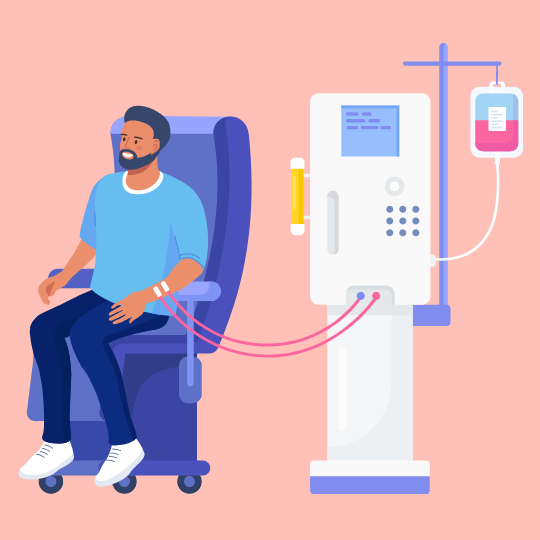Hemodialysis Overview
Hemodialysis is a renal replacement therapy used to treat individuals with end-stage renal disease (ESRD) or acute kidney injury. It involves removing waste products and excess fluids from the blood using a dialysis machine and an artificial kidney filter (dialyzer). Hemodialysis is typically performed in a clinic or hospital under the supervision of trained medical staff.
Hemodialysis Procedure
There are two main types of dialysis: hemodialysis and peritoneal dialysis. Hemodialysis involves using a machine to filter the blood outside the body, while peritoneal dialysis involves using the peritoneum (the lining of the abdominal cavity) as a natural filter inside the body.
Vascular Access:
A vascular access point is created to allow blood to flow from the body to the dialysis machine and back. Common types of vascular access include arteriovenous fistulas, arteriovenous grafts, and central venous catheters.
Blood Flow:
Blood is drawn from the patient’s vascular access point and pumped into the dialyzer, where it passes through a series of semi-permeable membranes.
Filtration:
Inside the dialyzer, waste products and excess fluids are removed from the blood through diffusion and ultrafiltration, mimicking the function of healthy kidneys.
Return:
The purified blood is then returned to the patient’s bloodstream through the vascular access point.
Duration:
Hemodialysis sessions typically last 3-5 hours and are usually performed three times a week, although the frequency and duration may vary depending on individual patient needs and medical recommendations.
Frequently Asked Questions
How often do I need to undergo hemodialysis?
Hemodialysis is usually performed three times a week, with each session lasting several hours. The frequency and duration of hemodialysis may vary based on individual factors such as kidney function, overall health, and treatment plan.
Is hemodialysis painful?
Hemodialysis itself is not painful, but some patients may experience discomfort during the insertion of needles into the vascular access point. Local anesthetics may be used to minimize discomfort, and Dr. Abhay Sadre’s team ensures patient comfort throughout the procedure.
Can I travel while on hemodialysis?
Yes, with proper planning and coordination, patients on hemodialysis can travel. Dr. Sadre helps patients make necessary arrangements, including scheduling dialysis sessions at a nearby clinic or arranging for dialysis facilities at their travel destination.
Are there any dietary restrictions while on hemodialysis?
Yes, patients on hemodialysis may need to follow dietary restrictions to help manage electrolyte levels, fluid balance, and other aspects of kidney health. Dr. Sadre provides personalized dietary recommendations tailored to each patient’s needs.
What are the potential complications of hemodialysis?
Complications of hemodialysis may include low blood pressure, muscle cramps, nausea, vomiting, infection, blood clotting, and access site complications. Dr. Sadre closely monitors patients for any signs of complications and takes proactive measures to address them promptly.
Can I stop hemodialysis once I start feeling better?
Hemodialysis is a life-saving treatment for individuals with kidney failure, and stopping treatment without medical supervision can be dangerous. Dr. Sadre works closely with patients to ensure they understand the importance of adherence to their prescribed hemodialysis regimen for optimal health outcomes.
Trusted By Thousands Of Patients

Dr. Sadre brings his renowned expertise to three easily accessible centers across Pune, ensuring convenient and comprehensive kidney health services for all.
Kidney Care Clinic
101, 383, Khopkar Heights, New, Quarter Gate Chowk, opposite Ymca, Rasta Peth, Pune, Maharashtra 411011
Phone: 08048035816
Alliance Dialysis Center
Alliance Munot Hospital, Timber Market Rd, near Seven Loves Chowk, Pune, Maharashtra 411002
Phone: 07276050161
Kothrud Dialysis Center
Sarvatra Society, Anand Nagar, Kothrud, Pune, Maharashtra 411038
Phone: 8999298294 / 9960579363

